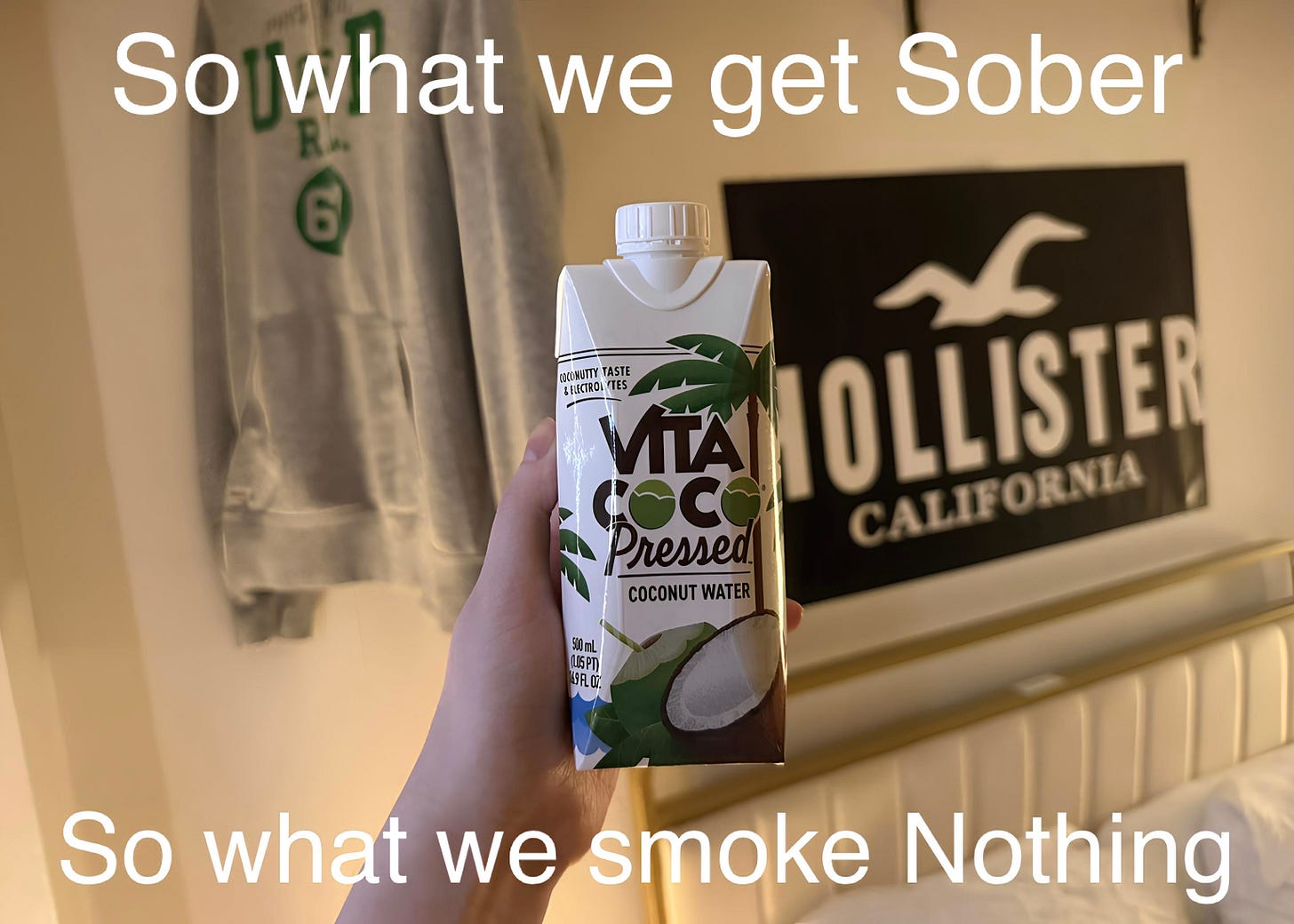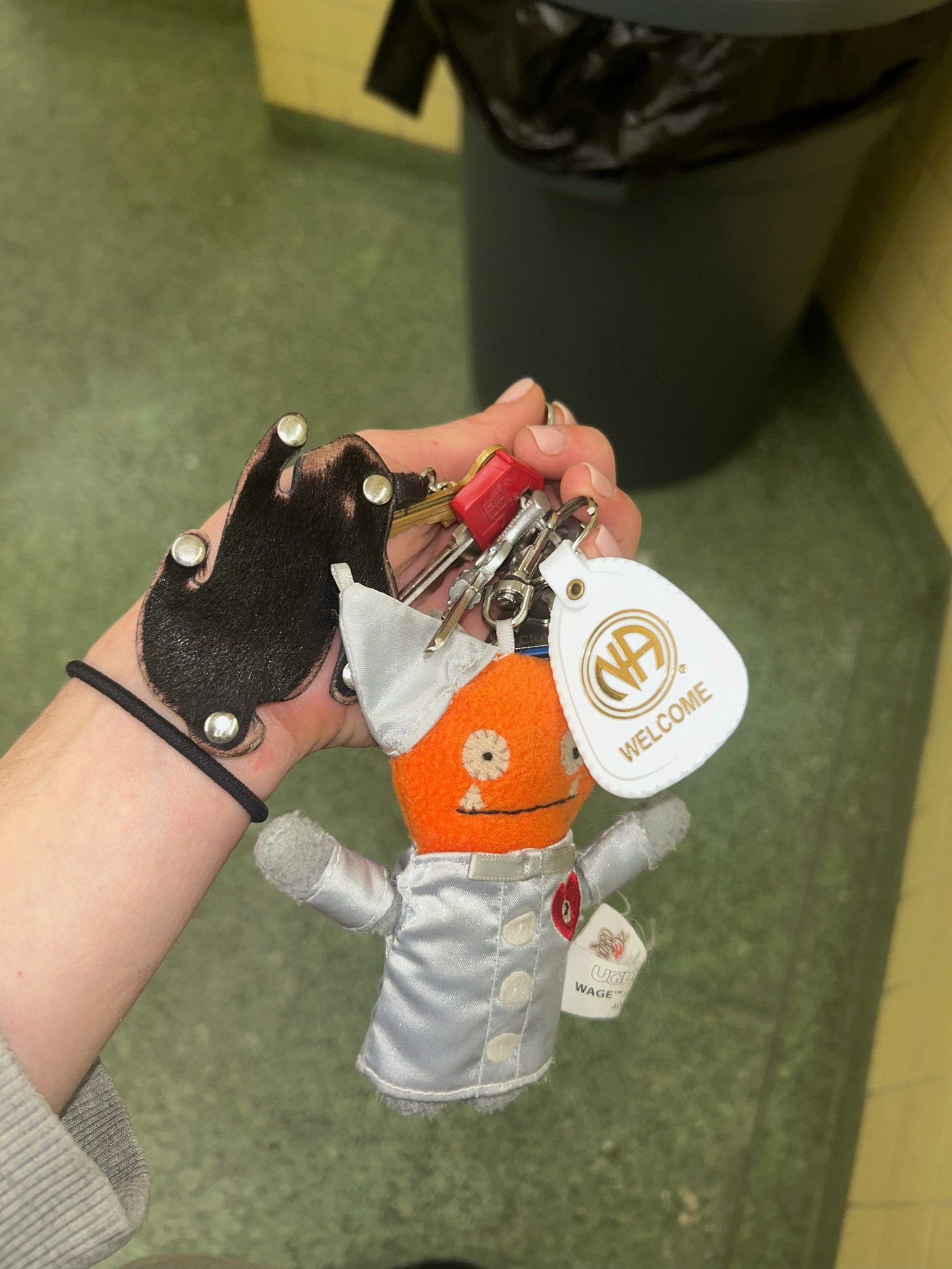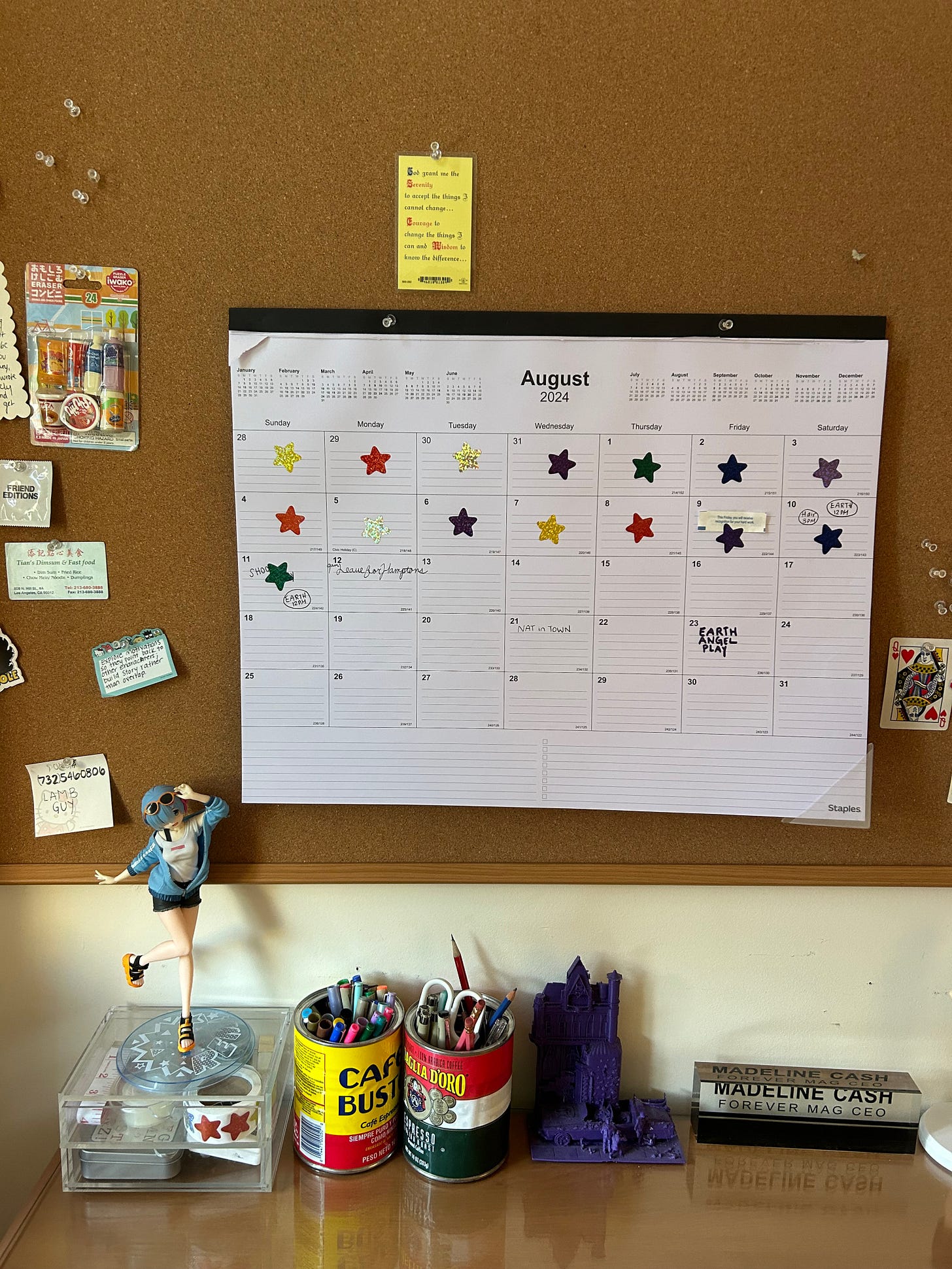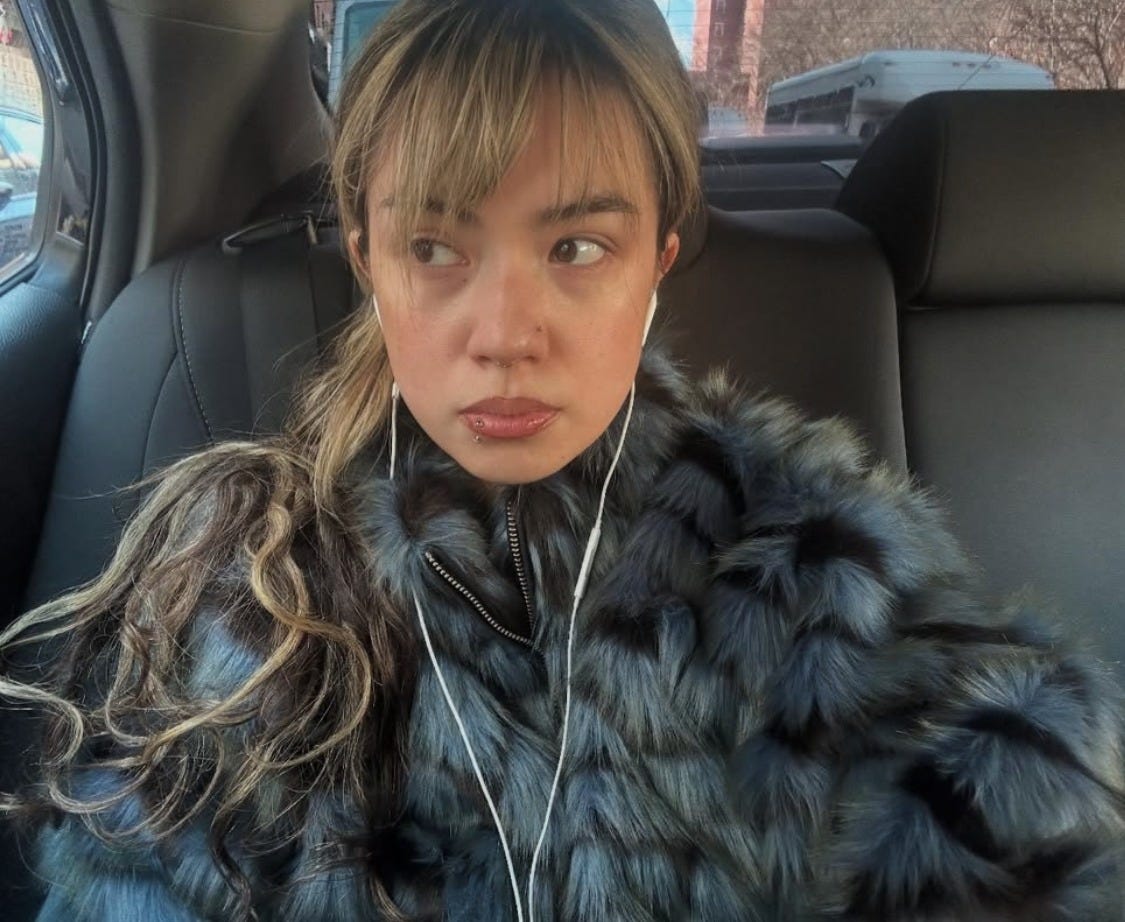5 People on Getting (and Staying) Sober
"I have to take risks all the time. I have to go insane."
Welcome back to Health Gossip. Today, we’re hearing from five people on how they got sober — and what’s kept them there. This is a long one, and there’s so much more to say... Read part two here.
Tess Pollok, Writer + Founder of Animal Blood Magazine
Location: Los Angeles
Sober: 11 months
@tessanditsdiscontents
What does sobriety look like for you?
Like many, I was resistant to admitting I was an alcoholic/addict for a long time. I avoided AA for a number of reasons — I’ve always had too high an opinion of my own intellect, so I used to think I could intellectualize my way out of any problem, and I suffered from a rugged sense of American individualism that made me unwilling to accept help. But I’ve come full circle on that. AA is incredible and I’m in awe that something as transformative and infinitely meaningful as AA is a free public service. It forced me to confront myself head on. I was surprised in the early months of my sobriety by how sophisticated AA’s philosophy was and how well it worked to provide people who were suffering with a toolkit for personal responsibility, self-discipline, and self-reliance. I sometimes feel like I’m in physical pain when I’m sitting in an AA meeting, which I think is a really good thing.
I think of sobriety as a lifelong thing. Not to say there aren’t relapses, but to me it’s a mindset you try to cultivate as you go. I don’t think people who relapse are any less committed to sobriety. At least in my experience, the “day-to-day” phase of sober thinking only lasted for the first few months while I was struggling not to use or drink when drugs and alcohol were around.
“I sometimes feel like I’m in physical pain when I’m sitting in an AA meeting, which I think is a really good thing.”
What led you there?
Frustration and resentment.
How have your relationships changed since?
I feel a lot less close with my friends, but I can’t tell if that’s actually a sobriety thing or if it’s just a part of getting older. I used to be in constant contact with my friends and I still have days where I’ll get these hypomanic bursts of social energy and text tons of people asking them what they’re up to. Speaking to the resentment, I’ll get down on myself that it’s taking me extra time to do things that I feel like other people around me are able to just naturally do. The difference now that I’m sober is that I have to sit with those feelings and figure out a way to work through them rather than just shove them aside, which is something I’m still learning.
One positive I’ve discovered is that I’m able to think more coherently about my life and make decisions that are more practical. I’ve always been high anxiety and neurotic, but sobriety has raised my baseline level of relaxation and emotional tolerance. I’m hoping that, over time, it’ll help me better manage my moods and make me a better communicator. I think AA is perfect for me but I definitely meet the threshold for someone that needs SLAA; my fantasies of what a job or a friendship should be often distract me from appreciating the reality of what my friends actually need or what a job actually requires. Sobriety is helping me cultivate an appreciation for things as they are.
How do you handle situations where people are drinking or using?
I actually don’t care that much. I just spent a weekend with my friends at the Château Marmont and many of them were drinking, someone brought Xanax, etc. It’s a bit of an odd experience to be with people who are on a bender when you’re sober but it’s not entirely unpleasant. I just kind of neutrally accepted that people around me were doing something different than I was and made the best of it. It wasn’t uncomfortable at all and I had a great time. Having mocktails and drying out by the pool was really fun.
What advice would you give to the sober curious?
The most interesting part of sobriety for me has been the perspective shift. Materially, it’s not about not drinking/using but doing the legwork to get there involves confronting things that can be painful. I’m sure you hear this all the time but when you start doing the “real work” you actually can feel a difference. I used to be too cynical to believe in something like that, but it really has helped me suffer less.
Vivi Hayes, Writer + Editor at Perfectly Imperfect
Location: New York
Sober: 3 years, 1 month
@vivihayes
What does sobriety look like for you?
Since my sobriety date, I’ve been completely clean of drugs and alcohol. I’ve committed to lifelong sobriety. It took time to get to where I’m at, but every day I feel incredibly blessed that I’m at a point where my brain doesn’t register substances as something possible for me to do.
What led you there?
The first time I drank alcohol was in my high school friend's basement. I was very curious and strangely methodological about it. I always took things too literally… experimentation… The first time I drank was the first time I had ever felt comfortable in my own skin. I once wrote that it was my first experience of true “warmth.” I was debilitatingly self-conscious — more than expected pubescent insecurity. It was something I had carried my entire life, and it was eviscerated the moment I drank. Once I realized this, I knew it would be my biggest problem. I never wanted to exist without that feeling.
“I attended my first AA meeting at 12 to watch him speak, and I remember the coffee being really not that good.”
My father was a recovered alcoholic and addict, an AA guy who had gotten sober before I was born. I attended my first AA meeting at 12 to watch him speak, and I remember the coffee being really not that good. Addiction ran in my family. I anticipated it.
Maybe the worst part of my addiction was that my ideal usage took place alone, in my room. Every time I had to go back into the world, I felt devastated. I was outgoing and extroverted, and I don’t think anyone ever sensed how much I had begun to dread interaction — or how much worse my self-consciousness had become in daily life. It was a polarizing time. I hated everyone for not noticing. I was baseline angry at the world. I felt entitled to the grace I’d somehow (miraculously) been given throughout my addiction.
This anger, resentment, loneliness, and self-loathing brought me to my lowest point. At my lowest point, I realized there were still things I wanted out of life. Secretly, there was so much I still loved about the world — like the art and music that had made me feel less alone in my isolation. I wanted to go to college. I wanted to write. I wanted to move to New York. I wanted to be a better friend. Eventually, I reached a point where my only option was to choose between my addiction and those wants.
What’s kept you there?
My life didn’t truly begin until I got sober. The things I am most proud of, I owe to my sobriety. It’s a beautiful life, even when it’s hard.
My faith has been my greatest source of comfort in sobriety — an even greater warmth than what I once felt drinking or using. So many times, I’ve said prayers that sound like I don’t know what to do. I feel so afraid and alone. I don’t want to hate the way I feel in my own skin anymore. I’ve placed that desperation and pain in His hands. My favorite thing about prayer is that it can be messy, tangential, and imperfect. You can ramble. God knows what is in your heart.
Maybe it’s a bit trite, but music, art, and literature have also brought me immense comfort. I got really into emo when I was first getting sober. I like engaging with art that is grotesque or ugly in some way — it feels like a mentally hygienic practice. It allows me to not feel alone in the struggles that led to my addiction in the first place.
A sillier ritual is that I always let myself drink something fun when I go out. Ginger beer or a mocktail. I WILL pay ten dollars for my fun adaptogenic fake alcohol whatever. It makes me feel not left out.
“For the most part, what I’ve struggled to accept is knowing when to go home. Even if it means pulling the occasional Irish goodbye.”
How has your social life changed since?
I still enjoy going out, but my tolerance for long nights and social battery have diminished. Sometimes, when people drink or use around me, I catch myself thinking, Literally, why? We were already having such a pleasant time…
For the most part, what I’ve struggled to accept (but what has helped me the most) is knowing when to go home. Even if it means pulling the occasional Irish goodbye. I’m not sad about it. Even if my night gets cut short, I don’t feel like I’m missing out on anything. I feel incredibly lucky that I can still go out and wake up the next morning without the weight of self-hatred or stress from the night before. I hope this doesn’t sound depressing or boring. I have way more fun now than I ever did before I got sober. It’s not even comparable. My capacity for joy increased tenfold.
What advice would you give to the sober-curious?
I’ve always said, it’s such a beautiful life. I’ve never had any regrets and never feel like I’m missing out. Take it in baby steps if that’s an option for you. Try one week, then see if you can extend it to two, or three. At the beginning of my sobriety, I didn’t expect it to be a lifelong thing (although I was aware that it would have to be someday.) I had hit a new low, was in a really dark place and just tried to make it one week clean to see if it would change anything. It did! It wasn’t until maybe two months in that I committed to lifelong sobriety. This is not the path for everyone and not universal advice. For me, the task was a lot less daunting and impossible-seeming this way.
At the beginning of my recovery, something ridiculous but helpful was keeping my mind busy– by any means necessary. I threw myself into early 2000s teenage television: One Tree Hill, The O.C. When I was struggling, it captured my attention just enough. In more difficult moments, when I was hurting or feeling an urge, I’d call a friend — not even necessarily to talk about what I was going through, just to get through it.
Madeline Cash, Writer
Location: New York
Sober: 8 months
@madelinecash
What does sobriety look like for you?
Alcohol & drugs. It’s one day at a time :)
What led you there?
I found that my life had become unmanageable.
What’s kept you there?
You're supposed to pray. I struggle with that. I go to the gym every day. I recommend smoking. If you already smoke, smoke more. If you don't smoke, buy a pack today.
How have your relationships changed since?
I can't sugar-coat it; they changed a lot. The real ones stick with you and the party friends continue on without you. I sometimes fear that my work thrived off the chaos that drinking and partying manufactured and suffers in its absence. But if I didn't stop drinking, I'd be dead, and my work would suffer if I was dead too, so. I don't know. Sometimes it's hard and uncomfortable and embarrassing. Someone in a meeting said that you can't save your ass and your face at the same time and I had to save my ass.
“Someone in a meeting said that you can't save your ass and your face at the same time and I had to save my ass.”
How do you handle situations where people are drinking or using?
Smoke. If it's cold outside or you have severe asthma or are pregnant or on an airplane, have a drink in your hand — coffee, seltzer/ bitters — to simulate "the norm." And if you're newly sober, you can avoid the same rooms you were partying in for a while. It's hard to switch modes in the same environment. Hang with sober people. You'll feel like everywhere you go, not drinking is weird. But there are just as many places where drinking is weird like museums and churches and Apple stores.
What advice would you give to the sober curious?
If you're just curious, you should probably keep drinking. Only you can assess the severity of the situation. If you have claw marks in it, it's probably not for you. Plain and simple: drinking is really fun and not drinking is really hard. I get that this is a health newsletter but I didn't do this so my skin would clear up (which it did) but because, if I didn't stop, I was going to die. That said, I have a life now that I never could have imagined. I'm in love and I lost twenty pounds and there's a light in my eyes.
Brad Phillips, Artist + Writer
Location: New York
Sober: 15 years
@brad___phillips
What does sobriety look like for you?
I've tried just being sober from certain, more objectively problematic things, but found that I have to just be sober from everything (save coffee and nicotine, both of which are still very unhealthy for me). If I think about it being lifelong, it's unbearable. I have to think about it as a daily thing, despite the fact that I know that it needs to be forever. If I consciously think of it as a forever thing, it's too much for me. If I was in a park one day and someone had mushrooms, I might take them. I've never stolen from my family to buy mushrooms, or lost years of my life to them. But even this, who knows. Maybe that's also a bad idea.
“I have to think about it as a daily thing, despite the fact that I know that it needs to be forever.”
What led you there?
The very clear evidence that I was destroying my life and the lives of people who cared about me. That and the unrelenting, brutalizing, emotional/physical/spiritual anguish I felt, and was exacerbating by using and drinking.
How have your relationships changed since?
All of my relationships are both easier and harder when I'm sober.
How do you handle situations where people are drinking or using?
I don't really give a sh*t about stuff like that. And drinking was never my primary problem. The things I liked were never socially acceptable.
What advice would you give to the sober curious?
Stop f*cking around and making excuses, and abandon the idea that you're somehow unique. You're not.
Mia Kerin, Artist
Location: New York
Sober: 7 years, 9 months, and 19 days
@miakerin
What does sobriety look like for you?
Sober from all addictive substances including alcohol
What led you there?
I couldn’t use drugs or alcohol and have successful experiences
What has kept you there?
I like it better than when I wasn’t sober. People support me. There needs to be someone in the world at all times that knows the contents of my mind, of my heart. I have to make space for my feelings and regulating them, so that means I have to make art, I have to work out, do yoga, write... Also, I have to do a bunch of stupid shit. I have to take risks all the time, otherwise life feels boring. I have to go insane. Sometimes, I have to make bad decisions.
“I have to take risks all the time, otherwise life feels boring. I have to go insane.”
How have your relationships changed since?
I have fewer friends that drink and use around the clock. I don’t really date people who do that either. I wouldn’t date someone who used hard drugs. I used to, but gradually I just stopped. I also think people invite me to fewer places the older I get if there are going to be drugs. I don’t know what they’re thinking—probably worried I won’t like it, or that it won’t be safe for me… Is either true? No… Sometimes, I meet people who think I’m really innocent…
How do you handle situations where people are drinking or using?
When I was earlier in my sobriety, like 21–25, I spent a lot of time at bars, clubs, parties, etc.! I’m not as social now. I still get sort of nervous, and at parties I’m pretty shy… I’ll just go on my phone and be shy. It usually takes a little bit of convincing from my friends to go anywhere, let alone somewhere where everyone is drinking or using. I just don’t know how to make myself feel comfortable a lot of the time. I feel silly and usually leave early, or I just say hi and go home and draw or listen to music. I am sort of a loner. But I appreciate it when my friends make me come out of my shell.
“It usually takes a little bit of convincing from my friends to go anywhere, let alone somewhere where everyone is drinking or using.”
What advice would you give to the sober-curious?
You will get used to it, that is, if you really want it. You will have fun. You will also wish you weren’t sober. It will get lonely. And if you really want it… you can’t let loneliness, frustration, fear, or whatever else stop you. You will survive your emotions. You will still be you. Maybe you’ll finally become the real you. Maybe you’ll have more fun than you were having before. Maybe you won’t. Either way, it’s all a matter of perspective.














this found me at just the right time :')
one year sober and loved this <3